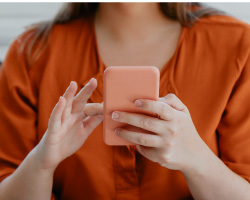
March 27, 2023—If you have a health app on your phone or other device, you're not alone. Consumer health apps have boomed over the past several years, and their popularity is no surprise. They can help you keep track of health information and achieve your health and fitness goals. But some apps may use or sell that health information.
Consumer health apps are often used to help people:
- Log meals and drinks throughout the day.
- Remember to take medications.
- Get discounts on prescription drugs.
- Track their physical activity.
- Manage a chronic health condition, such as high blood pressure.
But while consumer health apps can be helpful tools, it’s important to be aware of the information they collect and how they may use it—now or in the future.
Understand your privacy risks
When you go to the doctor, view test results on a patient portal, or submit an insurance claim, you can trust that your health information will be kept private. In fact, it’s protected by law. The Health Insurance Portability and Accountability Act of 1996 (HIPAA) is a federal law that safeguards your medical records and health insurance claims.
But HIPAA and other health regulations don’t apply to most consumer health apps.
Consumer health apps often sell the information they collect about you—including sensitive information, such as details of your health conditions and prescriptions or your medical and mental health history. That information is often used to target you with ads and offers. But the third parties who buy that data may use it for other reasons too.
What about the app's privacy policy? Breaking that privacy promise is against the Health Breach Notification Rule of the Federal Trade Commission (FTC). The FTC recently began enforcing that rule. But some research has found that it's common for data to be shared even when privacy policies say it won't be.
You may not be able to completely prevent your data from being collected and shared. But there are ways you can protect your privacy.
Managing your privacy
- Read the fine print. Find out what information the app will collect, who the company will share it with and if you will be able to delete your data in future. You should be able to find this information in the app’s terms and conditions or privacy policy. When these are updated, check to see how the changes might affect you.
- Check the settings. If you can, opt out of targeted ads. Check the settings on your phone or other device too. Think about whether the app really needs to access your contacts or camera, for example.
- Create a unique login. If you log in with a social media account, the social media company may be able to access your info. To avoid that, use an email address instead, and create a strong password.
- Keep the app updated. Installing any updates as soon as they’re available can help protect the app’s software from being hacked. It also helps the app function better.
- Delete it if you don’t need it. If you aren’t using the app any longer, delete it from your device.
Health apps are an excellent way to stay healthy and active. And you might be willing to share some information in exchange. But while you use them to empower your health, don’t forget to empower your privacy too!
Sources
- American Heart Association. “Health apps pose privacy risks, but experts offer this advice.” https://www.heart.org/en/news/2020/09/10/health-apps-pose-privacy-risks-but-experts-offer-this-advice.
- American Heart Association. “How to get the most out of health apps.” https://www.heart.org/en/news/2020/04/23/how-to-get-the-most-out-of-health-apps.
- Federal Trade Commission. "Complying with FTC’s Health Breach Notification Rule." https://www.ftc.gov/business-guidance/resources/complying-ftcs-health-breach-notification-rule-0.
- Federal Trade Commission. “Does your health app protect your sensitive info?” https://consumer.ftc.gov/consumer-alerts/2021/01/does-your-health-app-protect-your-sensitive-info.
- Federal Trade Commission. "FTC Enforcement Action to Bar GoodRx from Sharing Consumers’ Sensitive Health Info for Advertising." https://www.ftc.gov/news-events/news/press-releases/2023/02/ftc-enforcement-action-bar-goodrx-sharing-consumers-sensitive-health-info-advertising.
- Federal Trade Commission. "GoodRx's Not-So-Good Privacy Practices Come to Light." https://consumer.ftc.gov/consumer-alerts/2023/02/goodrxs-not-so-good-privacy-practices-come-light.
- Federal Trade Commission. “How to Protect Your Privacy on Apps.” https://consumer.ftc.gov/articles/how-protect-your-privacy-apps.
- National Council on Aging. "Digital Health Products: Is Your Information Safe?" https://www.ncoa.org/article/digital-health-products-is-your-information-safe.